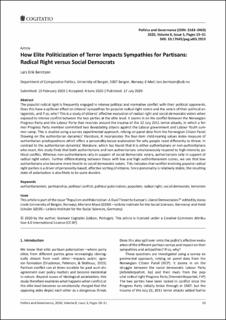| dc.contributor.author | Berntzen, Lars Erik | |
| dc.date.accessioned | 2021-04-29T11:42:04Z | |
| dc.date.available | 2021-04-29T11:42:04Z | |
| dc.date.created | 2021-01-04T20:34:33Z | |
| dc.date.issued | 2020 | |
| dc.Published | Politics and Governance. 2020, 8 (3), 19-31. | |
| dc.identifier.issn | 2183-2463 | |
| dc.identifier.uri | https://hdl.handle.net/11250/2740374 | |
| dc.description.abstract | The populist radical right is frequently engaged in intense political and normative conflict with their political opponents. Does this have a spillover effect on citizens’ sympathies for populist radical right voters and the voters of their political antagonists, and if so, why? This is a study of citizens’ affective evaluation of radical right and social democratic voters when exposed to intense conflict between the two parties at the elite level. It zooms in on the conflict between the Norwegian Progress Party and the Labour Party that revolves around the trauma of the 22 July 2011 terror attacks, in which a former Progress Party member committed two devastating attacks against the Labour government and Labour Youth summer camp. This is studied using a survey experimental approach, relying on panel data from the Norwegian Citizen Panel. Drawing on the authoritarian dynamics’ literature, it incorporates the four-item child-rearing values index measure of authoritarian predispositions which offers a personality-based explanation for why people react differently to threat. In contrast to the authoritarian dynamics’ literature, which has found that it is either authoritarians or non-authoritarians who react, this study finds that both authoritarians and non-authoritarians simultaneously respond to high-intensity political conflict. Whereas non-authoritarians rally in support of social democratic voters, authoritarians rally in support of radical right voters. Further differentiating between those with low and high authoritarianism scores, we see that low-authoritarians also become more hostile to social democratic voters. This indicates that conflict involving populist radical right parties is a driver of personality-based, affective sorting of citizens. Since personality is relatively stable, the resulting state of polarization is also likely to be quite durable. | en_US |
| dc.language.iso | eng | en_US |
| dc.publisher | Cogitatio Press | en_US |
| dc.rights | Navngivelse 4.0 Internasjonal | * |
| dc.rights.uri | http://creativecommons.org/licenses/by/4.0/deed.no | * |
| dc.title | How Elite Politicization of Terror Impacts Sympathies for Partisans: Radical Right versus Social Democrats | en_US |
| dc.type | Journal article | en_US |
| dc.type | Peer reviewed | en_US |
| dc.description.version | publishedVersion | en_US |
| dc.rights.holder | Copyright 2020 by the author | en_US |
| cristin.ispublished | true | |
| cristin.fulltext | original | |
| cristin.qualitycode | 1 | |
| dc.identifier.doi | 10.17645/pag.v8i3.2919 | |
| dc.identifier.cristin | 1865217 | |
| dc.source.journal | Politics and Governance | en_US |
| dc.source.40 | 8 | |
| dc.source.14 | 3 | |
| dc.source.pagenumber | 19–31 | en_US |
| dc.identifier.citation | Politics and Governance. 2020, 8 (3), 19–31. | en_US |
| dc.source.volume | 8 | en_US |
| dc.source.issue | 3 | en_US |

